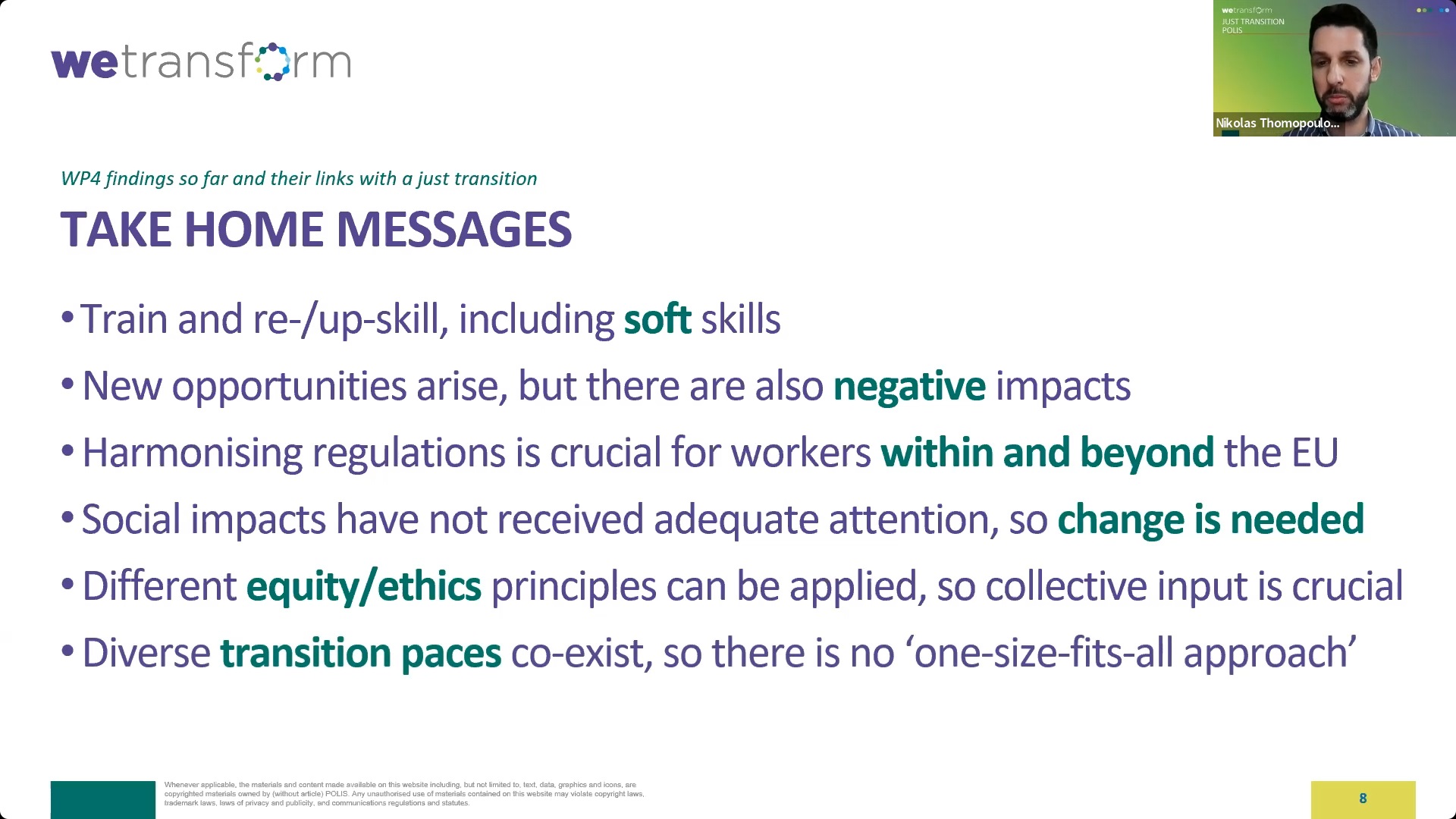WE-TRANSFORM x JUST TRANSITION webinar summary and outline
WE-TRANSFORM project together with POLIS led the Just Transition webinar on Governance & Integration: "What about the jobs?", that took place on the 7th March 2023
This particular webinar highlighted the most common challenges, current automation and digitalisation-related legal framework issues and generally explained what are the findings of WE-TRANSFORM consortium.
The webinar started with a short explanation of the Just Transition webinar series idea by Manon Coyne. Who was also a host and moderator of this online event.

After the introduction on What about the Jobs? topic, we stepped in to the speaker's introduction and discussion phase.
Speakers:
- Nikolas Thomopoulos – Lead Researcher, University of Surrey
- Chiara Notaro – Partner, Fabrique Avvocati Associati
- Luís Roda, Project Manager – Technical Control, EMT València
- Conor Farell - Policy Officer for Urban Public Transport, European Transport Workers' Federation

Firstly, Dr. Nikolas Thomopoulos, University of Surrey – WE-TRANSFORM WP4 Leader, hosted a presentation on the D4.1 ASSESSMENT OF THE IMPACT OF TRANSPORT AUTOMATION ON THE WORKFORCE overview . This Deliverable is a part of the WP4: Assessment of impacts of automation on the transport labour force.
Dr. Thomopoulos identified 6 main impact categories/challenges which accure as a result of automation and digitalisation, such as:
- Training skills & needs
- Business transition
- Policy & Regulatory
- Working conditions
- Social impacts
- Legal impacts
He briefly explained all of the identified challenges and outlined some key statements from out stakeholders and partners who joined WE-TRANSFORM focus groups and workshops, so far.
To summarise, he shortly highlighted current key project findings that may be useful to transportation sector employers, that you can find below:

Secondly, the webinar continued with the European Transport Workers' Federation Policy Officer - Conor Farell.
He emphasized the importance of WE-TRANSFORM findings and highlighted on the critical point of social dialogue, that dictates the changes for both workers and transportation sector. By using social dialogue we can find best practices for workers reskilling and integration easier. Therefore, the decision on what is the best way to retrain and reskill becomes more obvious. Using social dialogue also gives a feeling of greater engagement and being a part of a change, that gives further enhancement towards a faster digitalisation and automation implementation.

Chiara Notaro stepped in with the presentation on how automation and digitalisation influence the legal framework and regulations in general, outlining key challanges we face right now:
- Where to properly intervene in the process of digitalisation and automation? And how to do it in the best way?
- How to find the best regulations and adapt them?
- Absence of critical regulation related to competition
- Liability challenge - new conditions for work are required, therfore new regualtions must dictate new responsibilities and obligations
- The General EU framework need with harmonization on the local and national levels

Lastly, Luis Roda explained EMT Valencia concerns on the shift of the classic workforce concept. He emphasised that there is no workforce concept, as we knew it, anymore. Users became a part of the workforce, that also needs training and new skills to efficiently use nowadays tools - mobile apps, machines, and automated vehicles.
Additionally, more and more transportation companies use subcontractors and outstuff employers from all around the world to minimise costs. That dictates new challenges for the EU framework, as it must adapt and go beyond European Union borders. Furthermore, using AI technologies and AI machines which are practically workforce, but are not in terms of legal framework, create even more challanges for the new regulations.
Building the most convenient services for the users is key priority, which means that human workforce must be flexible and adaptable, as new challenges will occur more often.

After the presentation block finished, our speakers took part in a Q/A on the hottest topics concerning workforce in transpirtation sector and discussed their concerns on the regulation of automation and digitalisation.
In the end, Manon Coyne summarised the webinar and thanked to all the speakers and participants who joined us for a fruitful 1 hour discussion.

